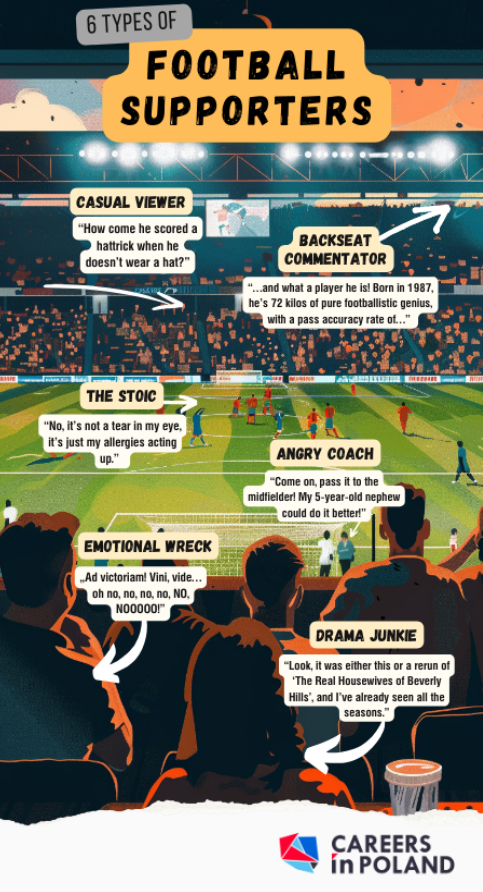6 types of football fans. Which one are you?

Editor

Photo by Sporlab, Unsplash
related articles
related offers
With Euro 2024 already in play, let’s look into six different types of football fans and their unique ways of watching the matches. From all of the options do you have a clue which kind of football supporter are you?

The Casual Viewer
“How come he scored a hattrick when he doesn’t wear a hat?”
The Casual Viewer is just excited to be part of the football experience. Whether in the stadium a local pub, these football fans revel in the communal atmosphere, enjoying the camaraderie of fellow supporters and the thrill of the match. The Casual Viewer’s primary joy comes from the shared experience of watching the game, rather than the outcome itself.
And sure, this type of supporter may not fully understand the intricacies of the game – they might not quite comprehend the rules of the offside and even believe that hattrick has something to do with hats – but those minor details will not stop them from cheering loudly when the ball falls into a goal – even if he’s not completely sure if it’s his team that scored. But the important part is that their enthusiasm is genuine!
The Backseat Commentator
“…and it’s Messi with the ball again! Ah, and what a player he is! Born in 1987, he’s a 170cm and 72 kilos of pure footballistic genius, with a pass accuracy rate of…”
On the opposite side of the spectrum from the Causal Viewer, who knows nothing about football, is The Backseat Commentator. Considered a walking encyclopedia of football knowledge, this type of supporter can provide a running commentary of the match, offering insights and statistics about every player on the field. The Backseat Commentator knows each player’s name, scoring and missing statistics, accuracy rates, and even personal details like their hight, weight, and date of birth. At times, it might seem as though the Backseat Commentator could recite the players' social security numbers if asked.
During a match, the Backseat Commentator keeps a constant stream of information flowing, whether anyone is listening or not. They analyze every pass, interception, and goal with a level of detail that rivals professional sports broadcasters. For the Backseat Commentator, the joy of football lies in the minutiae and the ability to share their extensive knowledge with those around them. Their encyclopedic recall and analytical approach make them a valuable companion for anyone seeking a deeper understanding of the game. For those who wish for no such understanding – unfortunately, this is one type of running commentary that cannot be solved by a “mute” button.
The Angry Coach
“Come on, pass it to the midfielder! My 5-year-old nephew could do it better!”
In many ways The Angry Coach is similar to the Backseat Commentator – but with a small twist. Think of it this way – if The Backseat Commentator is Dr. Bruce Banner, offering valuable game insights with almost scholastic zeal, then The Angry Coach would be the Hulk, who feels like the best way of imparting knowledge is by smashing some sense into the players – even if they can't possibly hear him through the TV screen.
The Angry Coach is a football supporter who seems to find fault with every aspect of the match. No pass is good enough, no interception timely enough, and no goal celebration sufficiently enthusiastic. The Angry Coaches believe they could do better if given a chance, despite often having little to no experience playing the sport themselves.
This supporter will criticize everything from the players' actions and strategies to their outfits and hairdos. The Angry Coach’s favorite pastime is dissecting the real coach’s decisions and lamenting the missed opportunities on the field. Their incessant critique can be grating to other supporters, but the Angry Coach remains unwavering in his belief that his insights are both necessary and profound.
The Stoic
“No, it’s not a tear in my eye, it’s just my allergies acting up.”
While the Angry Coach might lose his cool, the Stoic is a type of football supporter who embodies calmness and restraint during a match. This type of fan often values the strategic aspects of football, appreciating the tactical maneuvers and disciplined play over the raw emotional highs and lows. Thus, the Stoics usually watch the game with a composed demeanor, showing little to no emotion regardless of the action on the field. As the match progresses, and even when their team scores a goal or concedes one, the Stoic’s face remains unreadable.
However, this does not mean that the Stoics are indifferent to the outcome of the game. On the contrary, the Stoics are deeply invested in their team's performance, but they prefer to process their emotions privately. It's only at home, away from the prying eyes of fellow supporters, where the Stoic’s poker face might start to strain and the tears of joy or sorrow come falling down like rain.
The Emotional Wreck
„Ad victoriam! Vini, vide,… oh no, no, NOOO!”
In stark contrast to the Stoic is the Emotional Wreck. These supporters wear their hearts on their sleeves, experiencing every high and low of the match with unrestrained fervor. The Emotional Wreck's excitement is palpable, and their ecstatic yells can often be heard over the din of the crowd whenever their team shows initiative on the opponent's side of the field.
When their team performs well, the Emotional Wrecks' joy knows no bounds. They jump, scream, and cheer with abandon, their enthusiasm infectious to those around them. However, this emotional rollercoaster has a dark side. If their team fails or concedes a goal, the Emotional Wreck's despair can become a force to be reckoned with, a light-sucking black hole drawing the energy and optimism out of the surrounding supporters. Their mood swings are swift and extreme, making them one of the most passionate but also volatile types of football aficionados.
The Drama Junkie
“Look, it was either this or a rerun of ‘The Real Housewives of Beverly Hills’, and I’ve already seen all the seasons, so…”
Last but not least, we come to the final form of a football supporter – the Drama Junkie. As something of a cross between a high school theater kid and a jock, Drama Junkies watch football matches not just for the love of the game – but for the theatrics that come with it. While they appreciate a well-executed pass or a stunning goal, what the Drama Junkie truly craves are the dramatic moments that provide fodder for endless discussion and gossip.
Drama Junkies enjoy the things that might not be obvious to a casual fan. For example – instead of watching the game, like a normal viewer would, Drama Junkies thrive on watching the coach watching the game from the box at the stadium, where he is banished after talking back to the referee. Or when a player engages in on-field antics, such as when Zinedine Zidane discovered his inner ram and infamously headbutted an Italian player during the final of the 2006 FIFA World Cup.
And to be fair, football seems like a perfect sport for those who enjoy theatrics. The phenomenon of football players overacting when fouled is known as simulating or diving. To a certain degree of over-dramatization is necessary – it's meant to attract the referee's attention to a breach of the rules or even a player's injury. Yet sometimes, they lamented fouls have very little cause. At times it is enough to simply look at the replay to discover that there was little to no fault on the opponent's side, and the "foul" is a grand acting performance of the injured party.
The end effect is not unlike the fake carriage accident scene from Shrek 2, when it's not the Donkey, but a footballer writhing on the field, who ends up exclaiming: “Oh, God! Help me, please! My racing days are over! I'm blind! I'm blind! Tell the truth. Will I ever be able to play the violin again?”
Those are the moments The Drama Junkies truly relish, as in their view, this is what turns every football match into a theatrical performance worthy not only of a stadium but of the grandest stages.
And which kind of football supporter are you?












